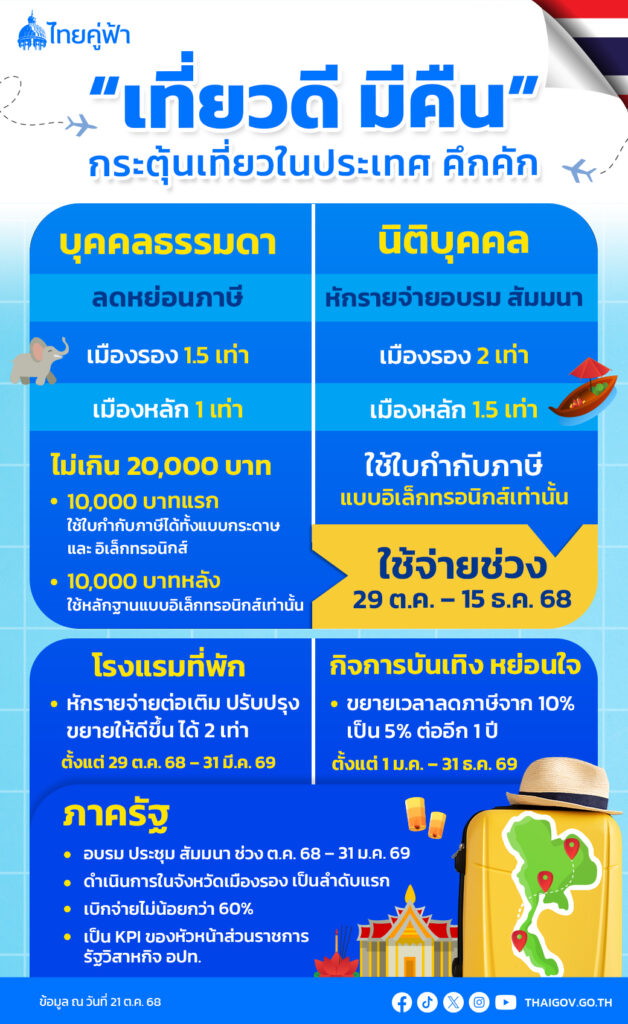Travel Thailand is supported by the Cabinet’s approval of four key domestic tourism stimulus measures, proposed by the Ministry of Finance, aimed at accelerating economic recovery in the final quarter of 2025 and continuing into 2026. These initiatives are designed to boost nationwide travel, increase spending, and stimulate both tourism-related revenue and employment across multiple sectors.
These measures not only directly impact the tourism industry, but also help drive the service sector, employment, and related businesses, particularly the hotel and restaurant sectors, which are linked to personnel and budget management in both the public and private sectors. Organizations can use human resource management systems (HR systems) and payroll programs to more efficiently manage expenses.
Measure 1: Individuals receive tax deductions to support tourism in secondary cities.
The public is now allowed to deduct their accommodation and restaurant service fees from their taxes, up to the actual amount paid, up to a maximum of 20,000 baht. The first 10,000 baht can be deducted using either paper or electronic tax invoices, while the remaining 10,000 baht can only be deducted using electronic evidence. This promotion is valid from October 29 to December 15, 2025.
- If traveling in secondary tourist provinces (55 provinces) or some districts in 15 additional provinces, you can deduct 1.5 times the actual expenses.
- For other provinces, a deduction of 1 time of the actual expenses is possible.
This measure aims to distribute income to local areas, stimulate the grassroots economy, and increase employment in the area, which will directly benefit small entrepreneurs in secondary cities.
Measure 2: Accelerate disbursement of training and seminar budgets (Front Load)
To stimulate spending in the public and state enterprise sectors, the government has issued a policy requiring various agencies to accelerate the disbursement of at least 60% of their budget for training and seminars between October 2025 and January 2026. Organizing training or seminars in tourist cities, especially secondary tourist provinces, will be another driving force for the circulation of money in the economic system, including costs for accommodation, food, travel, and local services.
Measure 3: Extend the tax reduction period for entertainment and leisure businesses.
The government has approved an extension of the excise tax reduction for entertainment and leisure businesses, Category 17.01, from 10% to 5% for another year (January 1 – December 31, 2026) to assist the service sector and entertainment venues affected by the economy.
Measure 4: Tax incentives for improving hotels and tourist attractions
The government also encourages hotel operators to renovate their premises and tourist attractions by allowing them to deduct double the expenses for additions, changes, or improvements to property related to their business between October 29, 2025, and March 31, 2026.
Meanwhile, state-owned banks, such as the Government Savings Bank, SME Bank, and the Export-Import Bank of Thailand (EXIM), have also prepared soft loan programs with a total credit limit of over 100 billion baht to assist hotel operators and related businesses in improving their operations and enhancing liquidity.

Positive impact on the economy and labor market
This set of tourism stimulus measures will increase domestic travel, particularly in secondary tourist provinces, resulting in increased income for operators in the tourism business chain, broader employment opportunities, and higher household income. This will boost economic growth by 0.04–0.05 percent in 2025 and by another 0.03–0.04 percent in 2026, compared to the scenario without the measures.
For businesses, these measures present an opportunity for adaptation, including personnel management, cost management, and tax planning, aligned with government policy. The government’s tourism stimulus measures at the end of 2025 will not only increase revenue for tourism operators and workers, but also serve as a significant driver of the overall economy. Implementing technology such as payroll programs and human resource management (HR) systems to manage personnel, taxes, and costs will enable both public and private sector organizations to drive sustainable business growth. COACH HCM supports the inclusion of special deduction conditions, such as “Travel Well, Get a Rebate,” into employee tax systems, enabling HR to accurately verify and calculate year-end taxes without the hassle of manual filing.
Q&A: 5 important questions and answers from the "Travel Well, Get a Return 2025" measure
Q: What types of homestays are eligible for tax benefits?
A: Only homestays that have been certified as “Thai Homestay” by the Department of Tourism and must register for VAT with the Revenue Department are eligible.
Q: Can I use the deduction only at restaurants in hotels?
A: It does not have to be a hotel restaurant. General restaurants that are registered for VAT can also use the deduction without having to stay at a hotel or homestay.
Q: What is an e-Tax Invoice? How is it used in this measure?
A: e-Tax Invoice is an “electronic tax invoice” issued in digital form. Eligible persons do not need to keep paper documents or submit tax invoices to the Revenue Department because the system automatically stores the information in the tax database.
Q: What hotels are eligible to use the “Hotel Improvement Tax”?
A: It must be a hotel that is licensed under the Hotel Act 2004 and falls into one of the four main categories:
Category 1 hotels – no more than 50 rooms
Category 2 hotels – more than 50 rooms or with a restaurant
Hotel type 3 – has rooms + restaurant + seminar room
Hotel type 4 – has rooms + restaurant + seminar room + service area
Q: What evidence is required to claim tax deductions?
A: Use a full tax invoice (Full Tax Invoice) in either paper or electronic format (e-Tax Invoice or e-Tax Invoice by Time Stamp), which must include the complete taxpayer identification number.
Source of content referenced from https://www.thaigov.go.th/th/media/infographic/8882

